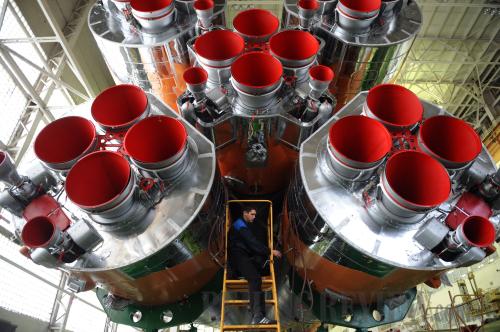 |
|
SPACE PROWESS: Assembly line of Russia's Soyuz TMA-20 spacecraft at the Russian-leased Baikonur Cosmodrome in Kazakhstan. U.S. and European companies are pushing for increased access to Russia's aerospace market (XINHUA) |
There were also internal obstacles for Russia. In order to stimulate economic recovery after the 2008 global financial crisis, the Russian Government dramatically increased import tariffs on many commodities and established a number of restrictions. These actions added to the difficulty in its WTO accession.
For instance, the Russian Government issued a new rule in December 2010 requiring foreign companies engaging in car assembly projects in Russia to invest at least $500 million, and assemble at least 300,000 cars per year, of which 30 percent should use Russian engines.
If Russian-made parts exceed 60 percent of the whole car by 2020, foreign car companies will be allowed duty-free imports of certain spare parts. This provision has aroused strong resentment from U.S. and European companies.
A recent survey showed 41 percent of respondents thought joining the WTO is good for Russia's long-term interests. Russian experts predict that joining the WTO could increase Russian GDP by 1.2 percent per year. Experts from the World Bank predicted that in the long term, joining the WTO could help Russian products enter the international market and build a more effective international cooperation mechanism for Russian enterprises. It could also enhance the attractiveness of investment in Russia and expand Russia's trade scale.
Russian officials believe joining the WTO may negatively impact certain enterprises or industries in the short term, but it will not affect the overall economy. In the long run, however, it will promote Russia's economic development.
After joining the WTO, Russian products won't be discriminated against when entering the international market. Russian companies can make full use of international trade dispute settlement mechanisms to resolve trade issues. Russian investors will have more overseas investment opportunities. And Russia's influence in international economic activities will be enhanced.
But joining the WTO could also have a negative impact. At the beginning, industries long protected by the government, including agriculture, light industry, machinery manufacturing, national defense, auto making, aircraft manufacturing, banking and insurance, will suffer competition from foreign companies.
After joining the WTO, Russia will see a rise in oil and gas prices. This will drive up costs and fuel inflation, making Russian products less competitive internationally.
In the meantime, Russia's non-resource products lack competitiveness on the international market, and the opening up of its market may increase its dependence on imported commodities.
After entering the WTO, Russia will have to lower its average tariff on imported goods from 10.2 percent to 6.9 percent. In the meantime, it has set a four-to-seven-year transition period for various goods. In trade in services, Russia will make market access commitments in 116 of the 155 service sub-sectors defined by the WTO.
In agricultural products, Russia will decrease its import tariff from 21.5 percent to 18.9 percent. From 2008 to 2012, it will provide a subsidy of $9 billion a year to its enterprises engaged in agricultural production and food export.
In addition, based on WTO regulations, Russia will revise the laws concerning customs procedures, technical barriers to trade, market protection, agricultural support, sanitation, animal and plant quarantine, and intellectual property.
Russia's accession to the WTO can help it integrate into the multilateral trading system, a move that will allow its trade partners to enjoy a more open market and a more transparent trade and investment environment. This should create opportunities for Russia as well as the global economy.
The author is a research fellow with the Chinese Academy of International Trade and Economic Cooperation | 